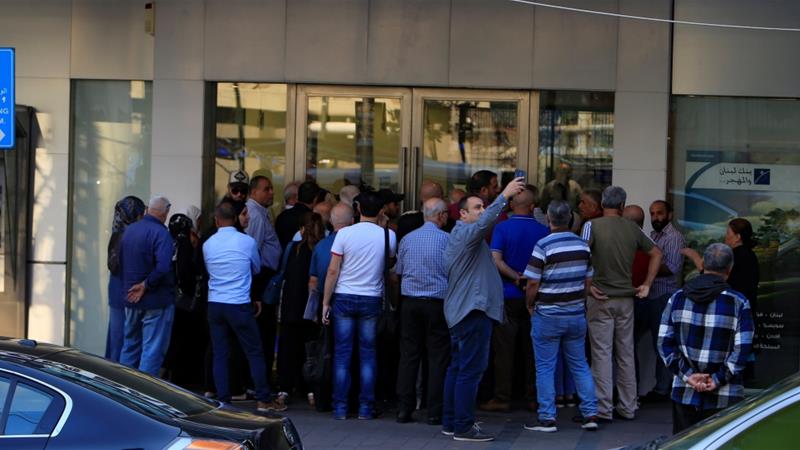After closing for more than two weeks following the massive uprisings that erupted on October 17, Lebanese banks re-opened their doors to massive chaos and depositors’ anxiety. Banks had imposed couple of months ago new restrictions on foreign currency accounts conversion and withdrawals, but this week many banks even stopped disbursing dollars to customers from their dollar-denominated accounts, citing shortages in the Benjamins. So where is your money? And who is responsible for it?
Suppose you put $1000 in your account. Your bank does not keep it there as is, it invests it to make money. It is necessary to keep $100 (10 percent) as required liquid reserves in Central Bank so, basically, $100 is the fastest amount it might be able to give you. What about the rest? Your bank has invested $500 in BDL certificates with very nice interest rates (which it is not willing to give up), gave $200 as loans to companies, $100 as loans to the government, and $100 as other assets. This breakdown follows the consolidated balance sheets of commercial banks as of September 2019.
So, if you want to withdraw your $1000 right now, the bank does not have them. Usually it relies on not having all people coming in to ask for their money: They use cash from other customers to pay the demanding ones, preferring not to touch their investments at BDL or in other places because they want to make profits. What does the bank do if many customers, like now, come knocking on its doors? It asks for a cash facility (cash loan) from other banks (which do not have money!) or from Central Bank. And since BDL is rationing the dollars it has to cater for multiple demands –especially by the corrupt government’s debt service– it is not providing the banks with the needed liquidity on time.
While it is legal for a bank not to immediately give you back your blocked deposits in term accounts (and sometimes, they impose a substantial fee if you insist), it is illegal for them not to give you back the dollars you have in your current account. But they simply do not have enough cash. This is their fault, the government’s fault, the BDL fault, and yes, somehow your fault too.
Commercial banks in the country have enjoyed a privileged treatment, with very little legal protection for customers and watchdog groups. They amassed large sums of money through lavish BDL certificates and interest rates, mainly through the famous financial engineering schemes of the past few years. This was all kind of expected since more than 40 percent of banks’ assets are owned by the ruling politicians themselves.
The Government’s corrupt practices and constant need for new money to finance its wasteful expenditures made it exercise a “concubinage” with the banks and BDL, with mutual accommodation of higher spending and higher interest earnings. BDL, whose role was to be an independent regulator of monetary policy, turned into a power-broker and financier of this whole system. Although maintaining the peg was and still is the main announced (and good) objective, this came at a huge social cost and large gains for a small group of crony capitalists.
And it is somehow your fault too. When the banks kept on increasing the interest rate on deposits to attract dollar savings, people gladly joined in. Between 2015 and 2019 deposits by residents in Lebanon in foreign currencies (mainly dollars) increased by $20 billion, mostly in high-interest earning term deposits averaging one year.
In parallel, the depositors enjoyed low taxes on wealth and interest income, which was barely increased recently, but still much lower than many other countries. This income many Lebanese earned was spent on mostly imported, expensive and non-essential commodities, increasing the country’s need for more dollars to finance these imports.
So what can be done? You can start by limiting your unnecessary consumption, taking less loans, and accepting that interest rates on your savings go down –of course, the big depositors should lead by example first. You should also not run to the bank to withdraw cash you don’t need, since this might actually cause more panic and less money for everyone. And you should keep on protesting, since a new “clean” government is a cornerstone to regaining trust in the system and reinvigorating our economy.
In parallel, Central Bank and the Association of Banks should save whatever is left of their reputation by clarifying and making regulations fairer and uniform across all banks. BDL has to issue a circular to unify all forms of controls and fees, with clear exceptions for merchants and special case withdrawals. People deserve responsibility, clarity and transparency in these difficult times.
